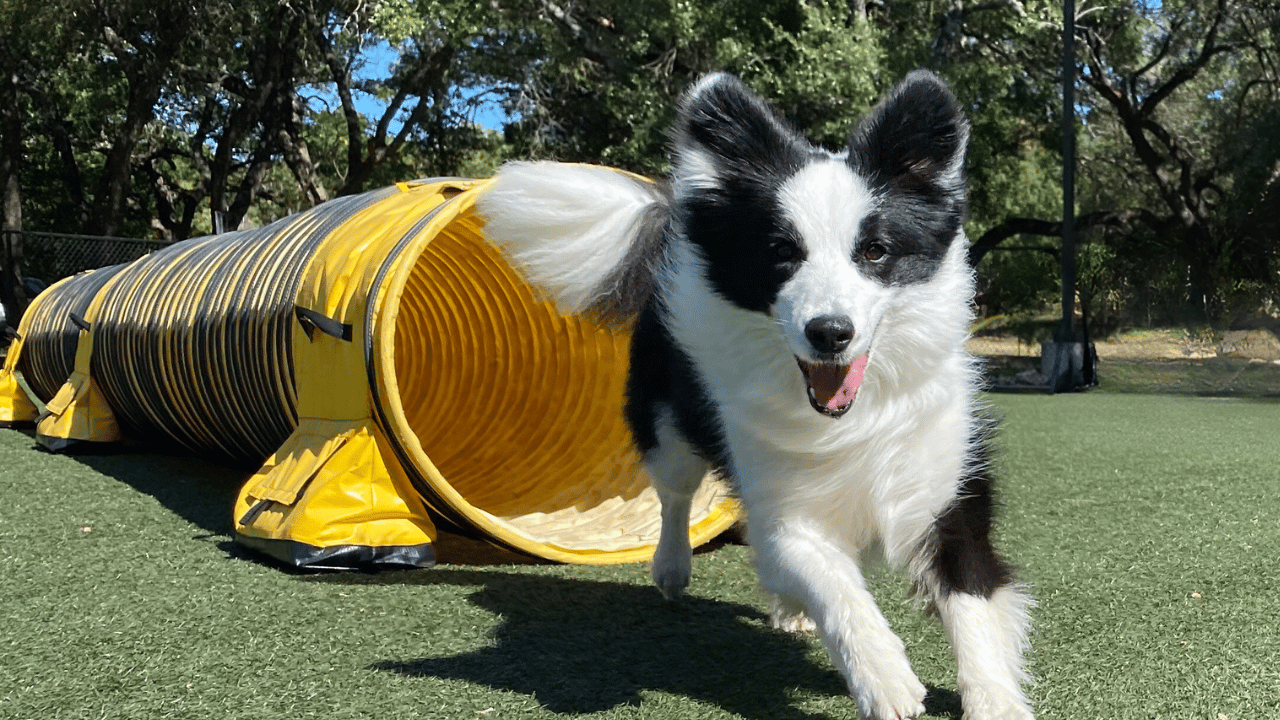ACM40322
Certificate IV
Animal Behaviour & Training -
Dog Trainer
- / Dog Trainer Course
- / Cert IV Dog Trainer Course
ACM40322
Certificate IV Animal Behaviour & Training -
DOG TRAINER

This course meets the Nationally Recognised Training standards. It is listed on the Australian Government’s National Register for Vocational Education and Training (VET).
Turn Your Passion for Dogs into a Professional Career
The Certificate IV in Animal Behaviour & Training at Dog Trainer Academy is a nationally recognised qualification that equips you with the knowledge and skills to become a professional dog trainer. Whether you’re looking to work in obedience training, assistance dog training, or behavioural modification, this course provides a structured, hands-on approach to learning.
This course is designed in five progressive stages, allowing students to develop their expertise through a combination of theory, case studies, and practical training blocks.
As part of your Certificate IV in Animal Behaviour and Training (Dog Trainer) course, you are required to complete two x 2-week practical training blocks. The training is designed to build your skills, confidence, and ability to work with a wide variety of dogs. Each student must attend one Training Block 1 and one Training Block 2 during their course. These blocks are essential for developing the practical experience needed to become a qualified dog trainer.

Course Structure
Delivered in 5 Stages
STAGE 1 – Foundation Knowledge & Canine First Aid
The first stage of the course lays the essential groundwork for becoming a skilled and knowledgeable dog trainer. You will develop a deep understanding of dog health, welfare, first aid, and the principles of responsible animal care.
You will gain skills in providing basic first aid for dogs, monitoring animal wellbeing, and ensuring compliance with industry standards. Additionally, you will learn about customer service and effective communication, which are essential when working with clients. This stage also covers workplace health and safety protocols, ensuring you can operate safely in training and animal care environments.
📌 Key Learning Areas:
- Dog health, welfare, and first aid
- Animal enrichment and wellbeing
- Workplace health and safety practices
- Effective communication and customer service in dog training
STAGE 2 – Dog Behaviour & Training Philosophies
In this stage, you will delve into the science of dog behaviour, training methodologies, and behavioural modification techniques. You will explore how dogs learn, interact, and respond to different training techniques, allowing you to develop effective, ethical training programs.
You will study canine body language, enrichment strategies, and animal behaviour assessments, enabling you to make informed decisions when working with different dog temperaments and behavioural challenges. This stage also introduces group training methodologies, providing insight into how to train multiple dogs and educate dog owners.
📌 Key Learning Areas:
- Understanding dog behaviour and communication
- Conditioning and enrichment strategies
- Positive reinforcement and training methodologies
- Group training and behaviour assessment techniques
STAGE 3 – Case Studies & Real-World Applications
This stage bridges the gap between theoretical knowledge and practical training. You will apply what you’ve learned in realistic case studies and scenarios, testing your ability to assess behaviour and develop training solutions.
By analysing real-world behavioural challenges, you will refine your skills in problem-solving, behaviour modification, and designing training programs for different situations. This stage prepares you for the hands-on training experiences that follow.
📌 Key Learning Areas:
- Applying behavioural knowledge to case studies
- Designing training plans for different behavioural challenges
- Problem-solving and adapting training methods to individual dogs
- Preparing for real-world client consultations
STAGE 4 – Practical Training Block 1
2 Weeks
In this first hands-on training block, you will begin applying your knowledge in a supervised practical setting. This stage focuses on building practical dog training skills, including obedience techniques, environmental exposure, and engagement training.
Students will work directly with dogs, practicing food and toy luring techniques, shaping behaviour, and introducing distance obedience training. This stage also introduces lesson planning, ensuring students understand how to structure effective training sessions.
📌 Key Learning Areas:
- Principles of dog training and behaviour shaping
- Obedience through motivation and positive reinforcement
- Engagement training and toy play
- Lesson planning and structuring effective training sessions
STAGE 5 – Practical Training Block 2
2 Weeks
The final stage of the course is an intensive practical training experience, where students refine their skills through real-world training applications. You will conduct behavioural assessments, develop group training plans, and deliver structured training sessions.
This stage focuses on training dogs for real-life situations, ensuring they can respond to basic obedience commands and develop good lifestyle behaviours. You will also gain experience in delivering group training sessions and refining your ability to work with both dogs and owners.
📌 Key Learning Areas:
- Lifestyle obedience and behavioural shaping
- Conducting behavioural assessments
- Developing and delivering group training plans
- Refining teaching and communication skills for client training

Course Information
ENTRY REQUIREMENTS
To be eligible for the Certificate IV Animal Behaviour and Training course, you must:
- At least 18 years old
- Completed Year 10 or Equivalent
- Access to a computer, laptop or tablet
- Internet access and email address
- Proficiency in speaking and writing in English
- Physically capable of restraining animals, handling animal feed and standing for extended periods of time.
COURSE ENROLMENT PROCESS
- Submit Enrolment Form
- Provide a form of ID
- Select a payment Plan
UNITS OF STUDY
While completing the ACM40122 Certificate IV in Animal Behaviour & Training qualification from the National Skills Training Institute, you will study the following subjects:
Core Units
ACMBEH301 Identify behaviours and interact safely with animals
ACMBEH402 Develop, implement and monitor enrichment strategies for animals
ACMBEH403 Evaluate animal conditioning methodology and program design
ACMBEH404 Condition animal behaviour
ACMGEN303 Assess the welfare status of an animal
ACMGEN304 Promote positive wellbeing in self and others in animal care workplaces
ACMGEN402 Advise on animal industry compliance and practices
ACMWHS401 Maintain workplace health and safety processes
Elective Units
ACMGEN309 Provide basic animal first aid
ACMGEN311 Maintain and monitor animal health and wellbeing
ACMSPE316 Provide general care of a domestic dog
ACMGEN315 Communicate effectively with clients and team members
BSBOPS404 Implement customer service strategies
ACMBEH405 Provide individual advice on animal behaviour management and training
ACMBEH406 Conduct group training classes for animal owners or carers
ACMBEH407 Conduct animal behavioural assessments
FEES & PAYMENT PLANS
The full fee for the course fee is $6,000.
Students have a choice of payment options that best suit their financial circumstances:
Payment Plans
For your convenience the Dog Trainer Academy offers two interest free payment plans, choose the one that best suits your lifestyle:
1. Direct Debit Options:
$39 per week (36 months)
$46.50 per week (30 months)
$58 per week (24 months)
$78 per week (18 months)
$116 per week (12 months)
2. Instalment Option: Pay in four (4) installments – 1st installment $1,500enrolment fee plus 3 x $1,500 installments
COURSE MATERIALS
Once enrolled, students will receive a student training pack that includes several important documents that students will be using for their study. These include:
Course Checklist – this step-by-step checklist helps the student with guiding them through the process of study and practical training
Student Learning Resource – this resource is the same as the student will complete via the online learning platform.
Practical Assessment Form – these forms are to be used by the student when completing practical training tasks at the workplace.
PRACTICAL TRAINING DATES
2025 DATES
Practical Training Block 1
- July 21st – August 1st or
- November 24th to December 5th
Practical Training Block 2
- September 22nd – October 3rd or
- Early 2026

- Course Duration:
- up to 24 Months
- Start Date:
- Enroll Anytime
- Delivery Mode:
- Online & Practical
- Fees:
- $6,000
- Payment Plans:
- From $39 per week

